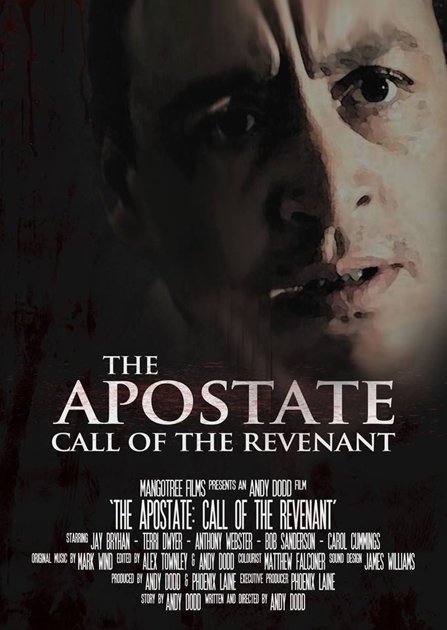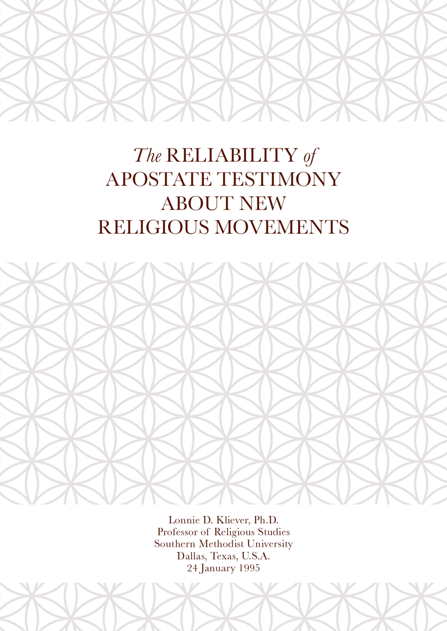
-
HOME
-
WHAT IS STANDOur Mission Our Values Our Help Contact
-
WHAT WE FIGHT FORReligious Freedom Religious Literacy Equality & Human Rights Inclusion & Respect Free Speech Responsible Journalism Corporate Accountability
-
RESOURCESExpert Studies Landmark Decisions White Papers FAQs David Miscavige Religious Freedom Resource Center Freedom of Religion & Human Rights Topic Index Priest-Penitent Privilege Islamophobia
-
HATE MONITORBiased Media Propagandists Hatemongers False Experts Hate Monitor Blog
-
NEWSROOMNews Media Watch Videos Blog
-
TAKE ACTIONCombat Hate & Discrimination Champion Freedom of Religion Demand Accountability
Apostates: My Personal Encounters
Using apostates to spread religious intolerance is not a new tactic, but in the age of the internet and life-as-entertainment, it’s taken on a new face.
By definition, an apostate is not just a person who wanders away from a faith. It’s a bit more serious than that. It’s “a person who renounces a religious or political belief or principle.” The word’s synonyms make the connotation clear: “dissenter, defector, deserter, traitor, backslider, turncoat.”

The truth is people leave churches all the time. They change or evolve their faith constantly, probably more today than in previous era due to our emphasis on multiculturalism, diversity and an unprecedented degree of access to information about other faiths and cultures. A sort of “backwards” proof that faith-changing is an everyday occurrence is that it doesn’t regularly headline the papers, the same way that when most of us change jobs, the Action News team doesn't show up at our front door. Moreover, when a person changes faith they don’t regularly secure a book deal or a TV show contract; quite the contrary, studies tell us that people who change or evolve their beliefs usually view their previous faith as part of a positive growing experience.
I’ve seen parishioners in my own religion, Scientology, demonstrate a fluid relationship with their church—individual levels of parishioner participation vary over time. Virtually all these changes occur quietly, certainly in terms of media interest, and tend to evolve organically.
Interestingly enough, the Church of Scientology has been experiencing something of a reverse trend. A growing number of members are re-engaging with the Church, sometimes after years of relative inactivity. This resurgence is easily traceable—it began in earnest after the Church completed a decades-long project that reviewed, verified and corrected all the Scripture of Scientology to ensure they were true to Scientology Founder L. Ron Hubbard’s original writings. That review was completed and released in 2007 and heralded an era of phenomenal growth in new membership—and also made re-engagement commonplace.
I think we all instinctively know that Church ex-members—when they are loud, grating and sensational—have an ax to grind, much like a bitter ex-spouse. Turns out the scholarly literature backs up that intuition: it explains that apostates are distinctly unreliable when talking about their former faiths, tend to blame others for their circumstances and are often on a mission to justify or explain their own actions.
But, that trend aside—which is specific to Scientology—the important point is many people join, leave or vary their participation in every religion, but very few become apostates.
So, what exactly is an apostate?
I think we all instinctively know that ex-members—when they are loud, grating and sensational—have an ax to grind, much like a bitter ex-spouse. Turns out the scholarly literature backs up that intuition: it explains that apostates are distinctly unreliable when talking about their former faiths, they tend to blame others for their circumstances, and they are often on a mission to justify or explain their own actions.
That makes sense in theory and matches what I’ve seen in the real world.
Several years ago, I met a former Scientologist, corresponded with him by email a few times and had a long discussion with him over dinner one evening. I was curious what drove him and asked about his experience with the Church. As he answered, I was struck by his continuing interest in Church beliefs and practices and the benefits he credited to his participation. He spoke almost fondly of his time as a Scientologist and his early days as a staff member at the local Church.
So what was his beef?
Today, apostates with outlandish claims are often given free rein to spread hatred and bigotry unchallenged. I always wonder what their underlying personal vendetta really is, or what exactly they are trying to justify.
Turns out that in the short time he was a staff member, he reported indirectly to a person he didn’t like. Once he started talking about it, he tried to impress on me how serious his complaints were about her, but it all sounded a bit strained. Virtually everything he said, even if true, could have been easily addressed using routine Church administrative procedures developed by Mr. Hubbard to ensure Churches of Scientology run smoothly.
He was the quintessential deserter—one who blames others while trying to justify and explain himself. This was further confirmed when a few months later he was detained by the police and charged with stalking or a similar crime in connection with the same woman he’d complained so much about. Great! A self-righteous stalker who had obviously betrayed the Church that had tried to help him.
Okay, that was one person. But I also remember another former member I had met some years earlier when he appeared on a local radio show to speak against Scientology. Oddly enough, instead of criticizing the Church, he confessed to things he had done as a Church member that violated fundamental Scientology ethical principles.
He clearly had not understood the first thing about Scientology and, based on his own statements, had become a lapsed member. That made sense to the radio host, but remarkably my comment impacted the defector more than I expected—he expressed actual remorse for his actions.

Both had been involved in the Church, albeit for a short time. Both were upset for highly personal reasons that had little to do with Scientology itself. Neither, for these reasons, was a reliable “source,” though that didn't stop either one from putting himself out there as an “expert.”
Today, apostates with outlandish claims are often given free rein to spread hatred and bigotry unchallenged. I always wonder what their underlying personal vendetta really is, or what exactly they are trying to justify.
Those who give such “ex-members” a platform obviously seek to profit from the seedy “news-as-entertainment” model. But however you add it up, at the end of the day, apostates and their media enablers need to be called out on what they are actually broadcasting: intolerance, discrimination and bigotry.









